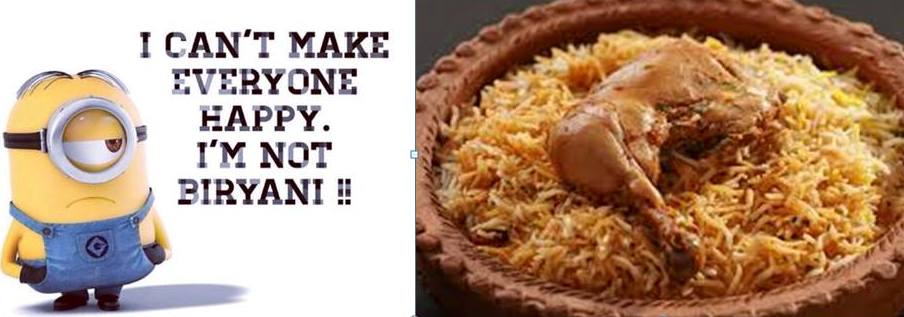It all started during the post 26/11 Mumbai terror-attack judicial proceedings when the public prosecutor, Ujjwal Nikam, claimed that the Pakistani terrorist Ajmal Kasab was fed Chicken Biryani and this was injustice not only to the martyrs but also to tax-paying Indian citizens. Later on, once the case was complete and justice was served, he retracted his statement saying "Kasab never demanded Biryani and was never served by the government. I concocted it just to break an emotional atmosphere which was taking shape in favour of Kasab during the trial of the case (emphasis mine)". By that time, the damage was already done to Biryani's image with its association with terrorism.
French Philosopher Pierre Bourdieu has an interesting view through his theory of symbolic violence on these damaging associations, when tacit and almost unconscious modes of cultural/social domination are thrust within the everyday social habits exercised over conscious subjects. This symbolic power is used to discipline or confirm an individual's place in a social hierarchy.
Once again the same imagery is used by the MP Chief Minister Mr Shivraj Singh Chauhan in his statement after the alleged fake encounter of 8 SIMI-under trials when he said "How long can you keep them under trial? Some people even get chicken biryani in jail (sic)". It is interesting to note that in MP, where 52% children are malnourished, the mid-day meal served does not contain eggs-- the most affordable and rich source of Proteins-- after an intervention by the vegetarian CM. It is unimaginable that Biryani is being served to the dreaded terrorism under-trials.
Prison and Biryani
Prisons do not serve Biryani. The most common phrase that represents the hardship of prison in Hindi is "Jail ki Roti". This phrase underscores a common man's food staple and associates it with the deprivation of freedom and control of body as a medium of reformation and punitive justice, inside a prison. Philosopher Michel Foucault posits in his seminal work 'Discipline and Punish' that the body of the condemned, the offender, is a site of deliverance of justice in modern jurisprudence in a much more veiled manner than medieval times. Gone are the days of torturous crucifixion, severing of limbs, or their public display. Modern jurisprudence does not equate itself with the criminal that commits the crime. In this complex relation of humane punishment and inhumane crime, food has come to play a role inside the prison, a means of control and deprivation to the body that is theorised to help in correcting the wrong doing as well as the wrong doer. In such a case, it is unbelievable and appalling to imagine a prisoner being served the happiness called Biryani.
Categorisation of Food
Rohit Varman, Marketing Professor from IIM Calcutta, in his latest research titled 'Curry' writes 'in [...] India, with a deepening of caste-based divisions, consumption of food signified discriminatory practices, as it got associated with norms of pollution and purity. Low castes could receive cooked food or water from upper castes, but the reverse was not acceptable (Achaya 1994; Jaffrey 1987). [...]Bhagwad Gita categorizes beef, pork, and strong brews as "tamasic foods [that] are cold, stale, and highly spiced rendering the eater dull and slothful" (Achaya 1994, 77). On the other hand, milk, honey, fruits, chicken, eggs, and wine are "sattvika foods [that] are savoury, nutritive and agreeable, conducive to serenity and spirituality" (Achaya 1994, 77). Accordingly, consumption of sattvika food created a sattvika or tranquil and detached nature, while tamasic food produced a tamasic or coarse, cold, and brutal temperament (Parry 1985)[...].
There is an idea being incepted that Biryani is a violent food. The association of Biryani with Prison, Terrorism and Violence is delegitimizing it as a humane food. It is an attempt to out-caste and condemn the society that eats it. Such association has moved beyond the idea of purity and pollution. A new condemned social location is being created that is defined on the basis of food, the food of the condemned, of those who don't have a space inside the civilized society. This association is the symbolic violence that the dominating inflicts on the dominated as Bourdieu has warned us. It is high time to shout out that "My Name is Biryani and I am Not a Terrorist".
~
References
- Jane Goodman (2009). Bourdieu in Algeria: Colonial Politics, Ethnographic Practices, Theoretical Developments.
- Foucault, M. (1979). Discipline and punish: The birth of the prison. New York: Vintage Books.
- Rohit Varman (2016): Curry, Consumption Markets & Culture
- MP denying egg to malnourished children Link: http://scroll.in/article/731585/not-just-madhya-pradesh- denying-eggs-to-malnourished-children-is-common-in-bjp-run-states
- Shivraj Singh Chauhan's statement after Simi-undertrials 'fake-encounter' : - http://www.firstpost.com/politics/cm-shivraj-singh-chouhan-says-undertrials-get-chicken-biryani-in-jail-calls-simi-operatives-dreaded-terrorists-3084082.html
- Kasab Never Asked for Biryani : http://timesofindia.indiatimes.com/india/Kasab-never-asked-for-biryani-we-fabricated-it-public-prosecutor-Ujjwal-Nikam-says/articleshow/46639254.cms




